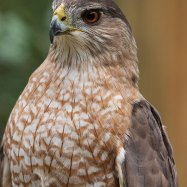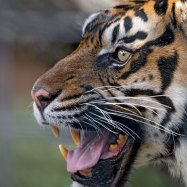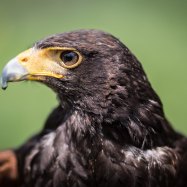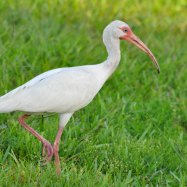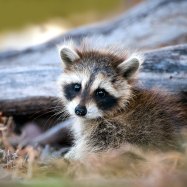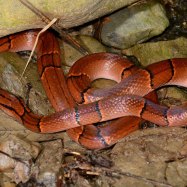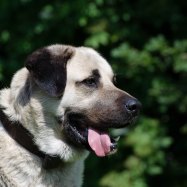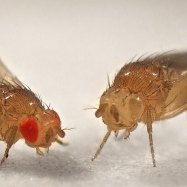
Cavalier King Charles Spaniel
30-33 cm
The Cavalier King Charles Spaniel is a beloved household companion known for its charming personality and small to medium-sized body. Belonging to the Canidae family, they are just 30-33 cm in length, making them the perfect lap dog for any family. Their friendly and affectionate nature makes them a great choice for households of any size. #CavalierKingCharlesSpaniel #Canidae #petlovers
Animal Details Summary:
Common Name: Cavalier King Charles Spaniel
Kingdom: Animalia
Habitat: Domesticated
Welcome to the World of Cavalier King Charles Spaniels: From Royalty to Loving Companions
As you scroll through your social media feeds, you may have come across photos of adorable, fluffy dogs with big, soulful eyes and long, flowing ears. These are Cavalier King Charles Spaniels, a beloved breed of dogs known for their charming personalities and lovable nature. But did you know that these dogs have a rich history and fascinating characteristics that go beyond their cute appearance? Join me as we delve into the world of Cavalier King Charles Spaniels and uncover all the hidden gems about this lovable breed.Scientifically known as Canis lupus familiaris, Cavalier King Charles Spaniels are a small to medium-sized breed of dogs belonging to the Animalia kingdom, Chordata phylum, and Mammalia class Cavalier King Charles Spaniel. As carnivores, they are part of the Carnivora order and belong to the Canidae family, which also includes wolves, foxes, and other types of domesticated dogs. But unlike their wild counterparts, these dogs have been domesticated and are now commonly found in households all over the world.
The Cavalier King Charles Spaniel's name may sound familiar, and that's because it has a royal connection. This breed is named after King Charles I and II, who were known for their love for small spaniels and often depicted with them in paintings. They were first introduced in the United Kingdom in the 16th century, where they quickly became a favorite among the aristocracy. Over the years, this breed has gained popularity and is now one of the most sought-after dogs by pet owners.
So, what is it about Cavalier King Charles Spaniels that make them so irresistible? Let's start with their physical appearance. These dogs come in various colors, including blenheim (chestnut and white), tricolor (black, white, and tan), black and tan, and ruby (solid red). This diversity in coloration adds to their charm and makes them unique from other breeds Cephalaspis. They also have a soft, silky coat that requires regular brushing to keep it healthy and shiny. And let's not forget about their big, expressive eyes that can melt the hearts of anyone who looks into them.
Aside from their adorable appearance, Cavalier King Charles Spaniels are known for their loving and loyal personalities. They have a kind and gentle disposition, making them perfect family dogs and great with children. They thrive on human companionship and form strong bonds with their owners. In fact, they are often referred to as the "love sponge" of the dog world due to their endless capacity for love and affection.
Furthermore, Cavalier King Charles Spaniels have a unique communication style that sets them apart from other dogs. They are known to be "talkers" and will use a range of vocalizations to express their feelings. They often make sounds that resemble cooing or humming, which can be quite amusing for their owners. And if that's not enough, they also have a habit of tilting their heads while listening, giving the impression that they understand every word you say.
In terms of their habitat, Cavalier King Charles Spaniels are domesticated animals and thrive in a household setting. They are not recommended for living outdoors as they crave human interaction and warmth. These dogs make for great indoor pets, but they also enjoy spending time outdoors, especially during walks or playtime with their owners.
Now, let's talk about food. As omnivores, Cavalier King Charles Spaniels can eat both meat and plant-based foods. However, their diet should consist primarily of high-quality dog food that meets their nutritional needs. Treats can also be given but in moderation to prevent obesity. It's essential to pay attention to their feeding habits and not overfeed them as they have a tendency to gain weight easily.
You may be surprised to know that this breed is not limited to just the United Kingdom. Cavalier King Charles Spaniels can be found all around the world, and their popularity continues to grow. They are also recognized by various kennel clubs, including the American Kennel Club, which added them to the breed registry in 1997.
When it comes to their size, Cavalier King Charles Spaniels are on the smaller side. On average, they measure between 30-33 cm in length and weigh around 5-8 kg. They are a breed of toy dogs, but their lively personality makes up for their small size.
Despite their small stature, these dogs have an impressive lifespan of 10-14 years, with some living even longer. However, like any breed, they are prone to certain health conditions, and responsible owners should be aware of them. This includes mitral valve disease (a heart condition), syringomyelia (a neurological disorder), and patellar luxation (knee dislocation). It's essential to do thorough research and get your Cavalier King Charles Spaniel from a reputable breeder to ensure they are healthy and have a good genetic background.
In terms of grooming, these dogs are relatively low maintenance. Their coat requires regular brushing to prevent matting and keep it free of tangles. They also need regular nail trimming, teeth brushing, and ear cleaning to maintain their overall health. Just like humans, these dogs also benefit from regular exercise, which can include walks, playtime, and training sessions. They are intelligent and eager to please, making them relatively easy to train.
In conclusion, Cavalier King Charles Spaniels are a wonderful breed of dogs with a lot of love to give. They have a rich history, quirky personalities, and make for great companions. Whether you're a first-time dog owner or a seasoned one, this breed is sure to steal your heart and become a beloved member of your household. From the royal courts to your loving home, these dogs have certainly come a long way and continue to bring joy and happiness to many families worldwide.

Cavalier King Charles Spaniel
Animal Details Cavalier King Charles Spaniel - Scientific Name: Canis lupus familiaris
- Category: Animals C
- Scientific Name: Canis lupus familiaris
- Common Name: Cavalier King Charles Spaniel
- Kingdom: Animalia
- Phylum: Chordata
- Class: Mammalia
- Order: Carnivora
- Family: Canidae
- Habitat: Domesticated
- Feeding Method: Omnivorous
- Geographical Distribution: Worldwide
- Country of Origin: United Kingdom
- Location: Household
- Animal Coloration: Various colors (blenheim, tricolor, black and tan, ruby)
- Body Shape: Small to medium-sized
- Length: 30-33 cm

Cavalier King Charles Spaniel
- Adult Size: 25-35 cm
- Average Lifespan: 9-14 years
- Reproduction: Sexual
- Reproductive Behavior: Mating
- Sound or Call: Barking
- Migration Pattern: Non-migratory
- Social Groups: Pack
- Behavior: Gentle, affectionate, friendly
- Threats: None
- Conservation Status: Not applicable
- Impact on Ecosystem: Not applicable
- Human Use: Companion and therapy dog
- Distinctive Features: Large, round, dark eyes; long, drooping ears; silky, medium-length coat
- Interesting Facts: Cavalier King Charles Spaniels are named after King Charles II of England, who was known for his love for this breed.
- Predator: None
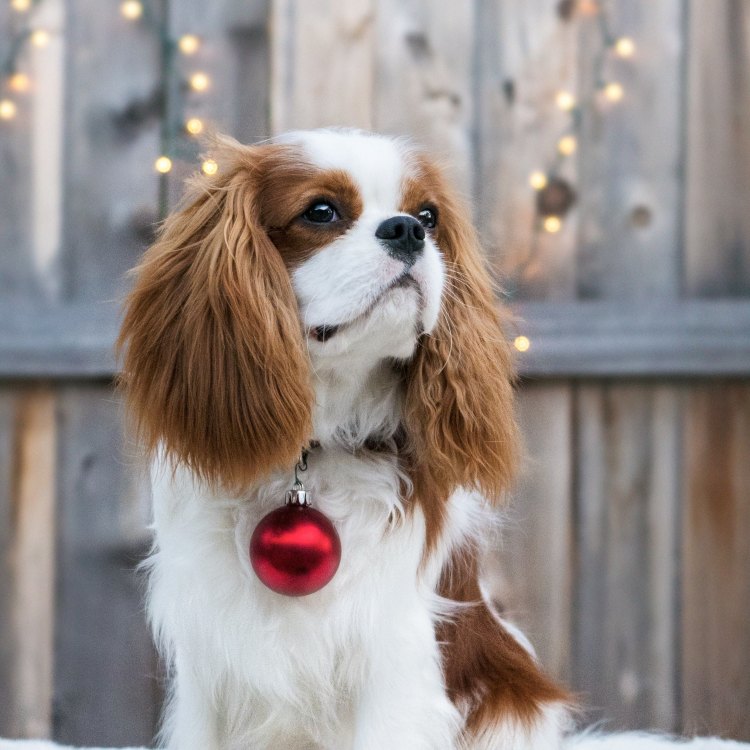
Canis lupus familiaris
The Gentle and Affectionate Cavalier King Charles Spaniel: A Royal Companion and Therapy Dog
Cavalier King Charles Spaniels are one of the most beloved dog breeds in the world. With their gentle and affectionate nature, it's no surprise that they are often chosen as companion and therapy dogs. But aside from their charming personality, these dogs also have distinct physical features and a rich history that make them stand out from other breeds.Adult Size and Average Lifespan
One of the first things people notice about Cavalier King Charles Spaniels is their size PeaceOfAnimals.Com. These dogs typically grow to be between 25-35 cm, making them a small to medium-sized breed. They are a great choice for those who live in apartments or have limited space, as they don't require a large area to run and play.
When it comes to their lifespan, Cavalier King Charles Spaniels have an average lifespan of 9-14 years. Of course, this can vary depending on their overall health, diet, and lifestyle. With proper care and attention, these dogs can live long and happy lives.
Reproductive Behavior and Mating
Like most mammals, Cavalier King Charles Spaniels reproduce sexually, with mating occurring between a male and a female. Unlike some other dog breeds, these dogs do not have any specific breeding season and can mate throughout the year.
When it comes to their reproductive behavior, these dogs are known for their gentle and affectionate approach. Males will typically initiate the mating process by playfully chasing and nipping at the female, who will then signal her readiness by lifting her tail Clarks Grebe. The mating process is quick and often accompanied by barking or other vocalizations.
Silky Coat and Distinctive Features
One of the most striking features of the Cavalier King Charles Spaniel is their coat. These dogs have a medium-length, silky coat that comes in a variety of colors including black and tan, ruby, and Blenheim (white and chestnut). Their coat is known for its soft and smooth texture, making these dogs a delight to pet and cuddle with.
But perhaps the most distinctive features of Cavalier King Charles Spaniels are their large, round, dark eyes and their long, drooping ears. These features give them an adorable and almost angelic appearance, which is one of the reasons why they are often chosen as therapy dogs.
Named After King Charles II
Cavalier King Charles Spaniels are believed to have originated from the King Charles Spaniel breed, which was a favorite among British nobility during the 16th century. However, it was during the reign of King Charles II of England in the 17th century that these dogs gained their royal status.
King Charles II was known for his love for these dogs and was often seen with them by his side. He even issued a decree that allowed these dogs to enter any establishment in England, regardless of their "no dogs" policy. It is said that he loved these dogs so much that he even allowed them to sleep on his royal bed!
Pack Behavior and Barking
Cavalier King Charles Spaniels are social animals and are known to form strong bonds with their owners and other dogs. They are often seen in packs, playing and exploring together. This pack behavior is also exhibited in their barking. These dogs are known to be quite vocal, especially when they are playing or excited. However, they are not known to be excessive barkers and can be trained to control their vocalizations.
Great Companion and Therapy Dogs
It's no surprise that Cavalier King Charles Spaniels make excellent companion and therapy dogs. Their gentle and friendly nature, combined with their small size, make them suitable for people of all ages, from children to seniors. They thrive on human companionship and are often described as lap dogs, as they love nothing more than cuddling with their owners.
These dogs also make excellent therapy dogs due to their calm and affectionate demeanor. They are often seen bringing joy and comfort to children and adults in hospitals, nursing homes, and schools. With their ability to sense and respond to human emotions, they are great at providing emotional support and companionship.
No Predators or Threats
Unlike some other dog breeds, Cavalier King Charles Spaniels do not have any known predators in the wild. They were bred primarily as companion dogs and were not used for hunting, so they lack the instinct to chase or protect against predators. In a domestic setting, these dogs are not known to be aggressive and do not pose any threat to humans or other animals.
Not Applicable Conservation Status and Ecosystem Impact
Cavalier King Charles Spaniels are not listed as a vulnerable or endangered breed. In fact, they are quite popular as pets, which has led to them being overbred and contributing to the issue of puppy mills. It is important for potential owners to do their research and adopt from reputable breeders to help combat this issue.
As for their impact on the ecosystem, these dogs do not have any significant impact. They are domesticated animals and are not known to have any negative effects on the environment.
Human Use and Enduring Popularity
From their origins as royal pets to their current status as companion and therapy dogs, Cavalier King Charles Spaniels have always been used by humans. Their small size and loving nature make them the perfect breed for those looking for a furry companion.
Their enduring popularity can also be attributed to their adaptability. They are suitable for both small and large households, can thrive in urban and rural environments, and make great family pets for those with children or other pets.
In Conclusion
Cavalier King Charles Spaniels are more than just a pretty face. Their gentle and loving nature, combined with their distinctive physical features and rich history, make them a beloved breed around the world. Whether it's as a royal companion or a therapy dog, these dogs have proven time and again that they are more than just a pretty face – they are valuable companions and members of the family.
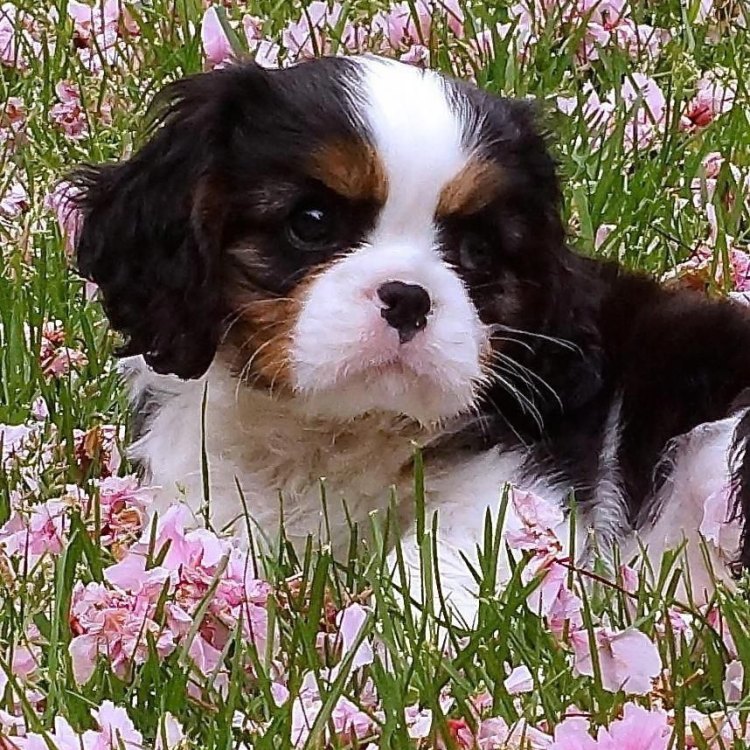
Welcome to the World of Cavalier King Charles Spaniels: From Royalty to Loving Companions
Disclaimer: The content provided is for informational purposes only. We cannot guarantee the accuracy of the information on this page 100%. All information provided here may change without prior notice.

